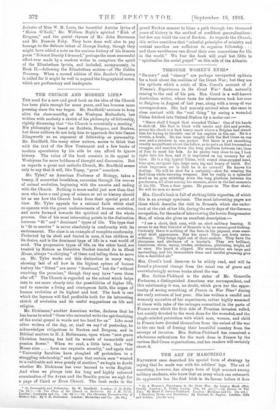THE CHURCH AND MODERN LIFE.*
THE need for a new and good book on the idea of the Church has been plain enough for some years, and has become more pressing since the war began. Mr. Bradfield,' anxious to keep alive the class-meeting of the Wesleyan Methodists, has written with modesty a sketch of his philosophy of fellowship, rightly discerning that "the Church is essentially a meeting." His philosophy is based on Baldwin, Bergson, and Euoken, but these authors do not help him to approach the late Canon Illingworth as an exponent of fellowship or personality. Mr. Bradfield, like many other writers, seems to think that with the text of the New Testament and a few books of modern speculation by his side he can afford to ignore history. The value of the book consists in its appeal to Wesleyan for more boldness of thought and discussion. But as regards a great and catholic Church, Mr. Bradfield seems only to say that it will, like Topsy, "grow" somehow.
Mr. Tyler,' an American Professor of Biology, takes a breezy, if somewhat breathless, excursion through the course of animal evolution, beginning with the amoeba and ending with the Church. Nothing is more useful just now than that men who have a real grasp of science or art or history should let us see how the Church looks from their special point of view,. Mr. Tyler appeals for a rational faith which shall co-operate with the great undercurrents of human evolution, and move forward towards the spiritual end of the whole process. One of his most interesting points is the distinotion between " fit " and " dominant " types of life. The type that is "fit to survive" is never absolutely in conformity with its environment. The clam is an example of complete conformity. Protected by its shell and buried in ooze, it has children at its desire, and is the dominant type of life in a vast world of mud. The progressive types of life, on the other band, are treated by Nature as Detective Bucket treated Jo in. Bleak House, always "a-chivying" of them and telling them to move on. Mr. Tyler works out this distinction in many ways, showing last of all bow in the highest sphere of human history the " fittest " are never "dominant," but die " without receiving the promises," though they may have "seen them afar off." The Church is regarded as the school which helps men to see more clearly into the possibilities of higher life, and to exercise a living and courageous faith, the organ of human evolution at its highest and best. The book is one which the layman will find profitable both for its interesting sketch of evolution and its useful suggestions on life and religion.
Mr. Dickinson,3 another American writer, declares that he has borne in mind "those who entreated write the spiritualizing of the social gospel in words not too hard for us." Like most other writers of the day, or, shall we say P of yesterday, he acknowledges obligations to Eucken and Bergson, and in Biblical matters to H. J. Holtzmann, upon whose "new grave Christian learning has laid he wreath of immortelle and passion flower." When we read, a little later, that "the
Muses nine . . . form one exquisite sorority," and again that "University faculties have sloughed off pretenders to a straggling scholarship," and again that certain men " wonted
to a cultivable soil were greedy of another," we begin to doubt whether Mr. Dickinson has ever learned to write English.
And when we plunge into his long and highly coloured examination of the Aryan and the Semitic genius we sigh for a page of Caird or Dean Church. The book seeks in the
• (1) Personality and Fellowship. By W. Bradfield. London: C. H. Kelly. r3 s. 6k.1.1--(2) 3'he Place of the Church in. Evolution. By J. M.. Tyler. London : Constable and Co. [4s. 6d.1—(3) The Christian Reconstruction of Modern Life. By C. H. Dickinson. London: M.aomillau and Co. [6s. 6d.]
grand Eucken manner to blaze a path through two thousand years of history in the method of confident generalizations : but few can wield the axe of Eucken. As regards the Church, this writer considers that "celestial principles of ministry and mutual sacrifice are sufficient to organize fellowship . . . and these excellences can direct their own concretions for life in the world." We fear the book will avail but little to " spiritualize the social gospel " on this side of the Atlantic. ,


































 Previous page
Previous page